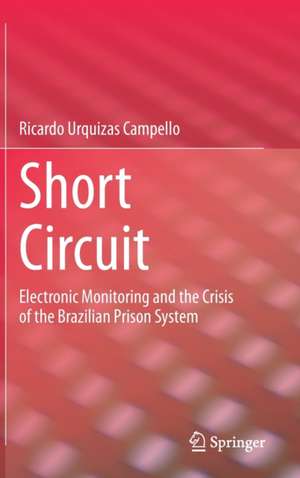Short Circuit: Electronic Monitoring and the Crisis of the Brazilian Prison System
Autor Ricardo Urquizas Campello Traducere de Claudio Altenhain, Sebastian Nascimentoen Limba Engleză Hardback – feb 2023
Drawing upon both ethnographic research and genealogical analysis, this book represents the first in-depth scientific analysis of criminal offenders’ electronic monitoring (EM) in Latin America’s largest country. It focuses on three empirical axes: 1) the implementation of EM policies against the backdrop of Brazil’s collapsing carceral system; 2) the discourses and rationalities which undergird the deployment of EM; and 3) the effects of EM upon convicts moving back and forth between penal institutions and urban spaces governed by armed militias, criminal gangs, and abusive police forces.
The book is ideal for researchers and practitioners concerned with the fields of criminal justice and public security all over the world.
The book is ideal for researchers and practitioners concerned with the fields of criminal justice and public security all over the world.
| Toate formatele și edițiile | Preț | Express |
|---|---|---|
| Paperback (1) | 720.53 lei 6-8 săpt. | |
| Springer International Publishing – 2 feb 2024 | 720.53 lei 6-8 săpt. | |
| Hardback (1) | 726.55 lei 6-8 săpt. | |
| Springer International Publishing – feb 2023 | 726.55 lei 6-8 săpt. |
Preț: 726.55 lei
Preț vechi: 886.03 lei
-18% Nou
Puncte Express: 1090
Preț estimativ în valută:
139.09€ • 143.12$ • 117.24£
139.09€ • 143.12$ • 117.24£
Carte tipărită la comandă
Livrare economică 01-15 martie
Preluare comenzi: 021 569.72.76
Specificații
ISBN-13: 9783031218583
ISBN-10: 3031218582
Pagini: 142
Ilustrații: XXII, 142 p. 3 illus.
Dimensiuni: 155 x 235 mm
Greutate: 0.41 kg
Ediția:1st ed. 2023
Editura: Springer International Publishing
Colecția Springer
Locul publicării:Cham, Switzerland
ISBN-10: 3031218582
Pagini: 142
Ilustrații: XXII, 142 p. 3 illus.
Dimensiuni: 155 x 235 mm
Greutate: 0.41 kg
Ediția:1st ed. 2023
Editura: Springer International Publishing
Colecția Springer
Locul publicării:Cham, Switzerland
Cuprins
Introduction.- Short circuit.- Lines of emergence.- Diagrammatic Compositions.- Converging Enunciations.- Out of control.- Afterword.- Index.
Notă biografică
Ricardo Urquizas Campello earned his degree from the Graduate Program in Sociology of the Faculty of Philosophy, Letters and Human Sciences of the University of São Paulo (FFLCH-USP), with a grant from the Fundação de Amparo à Pesquisa do Estado de São Paulo (FAPESP). He completed a Doctoral Internship at the Centre de recherches Sociologiques sur le Droit et les Institutions Pénales (CESDIP), with a FAPESP BEPE grant. He holds a Master in Social Sciences from the Pontifical Catholic University of São Paulo (PUC/SP), having received a scholarship from the National Council for Scientific and Technological Development (CNPq). In his studies, he develops research on current modulations of control and punishment, penal and prison system, electronic monitoring, and forensic DNA databanks.
Textul de pe ultima copertă
Drawing upon both ethnographic research and genealogical analysis, this book represents the first in-depth scientific analysis of criminal offenders’ electronic monitoring (EM) in Latin America’s largest country. It focuses on three empirical axes: 1) the implementation of EM policies against the backdrop of Brazil’s collapsing carceral system; 2) the discourses and rationalities which undergird the deployment of EM; and 3) the effects of EM upon convicts moving back and forth between penal institutions and urban spaces governed by armed militias, criminal gangs, and abusive police forces.
The book is ideal for researchers and practitioners concerned with the fields of criminal justice and public security all over the world.
The book is ideal for researchers and practitioners concerned with the fields of criminal justice and public security all over the world.
Caracteristici
Focus upon the Brazilian case enables innovative perspectives upon contemporary penal technologies Methodological articulation of ethnography and genealogy facilitates understanding of EM technologies Articularly well structured and cohesive, favoring a fluid and stimulating reading
